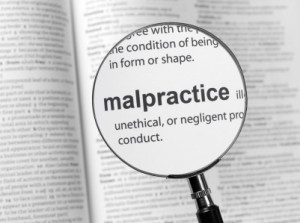 When a person seeks medical assistance for an ailment, that person expects to receive adequate and knowledgeable treatment. Upon discussing and determining medical treatment, the physician and patient engage in a doctor-patient relationship. By engaging in a doctor-patient relationship, the physician has a duty of care to the patient.
When a person seeks medical assistance for an ailment, that person expects to receive adequate and knowledgeable treatment. Upon discussing and determining medical treatment, the physician and patient engage in a doctor-patient relationship. By engaging in a doctor-patient relationship, the physician has a duty of care to the patient.
Medical treatment should always meet certain standards of care, which are aimed at providing the patient with the safest and most effective treatment.
According to the Hippocratic Oath, the doctor shall first and foremost do no harm to the patient. In a case of medical malpractice or medical negligence, the patient is injured as the result of the medical professional committing a breach of duty. A breach of duty occurs when the medical professional fails to meet standards of medical care.
To prove medical malpractice or medical negligence, the plaintiff must establish the following:
- Doctor-Patient Relationship – Medical professionals may only be held liable for acts of malpractice which were committed within the terms of employment. For this reason, the plaintiff must provide evidence that the patient hired the medical practitioner. There must also be evidence provided to establish that the medical practitioner agreed to work for the patient. Generally, this can be confirmed through recorded proof of monetary compensation for medical services.
- Duty of Care – Medical professionals must provide care that is widely accepted as the standard of care within the medical community. All medical professionals have legal obligations to their patients. The medical provider must act in the same way that another health care provider, in the same field and situation, would behave.
- Breach of Duty – To be proven negligent, a medical professional must violate the duty of care owed to the patient. To violate the duty of care, there must be evidence that the medical practitioner failed to act in the same way that another practitioner would have in that situation.
- Causation – In addition to proving breach of duty, the plaintiff must supply evidence to establish that the medical provider’s negligent act was the cause of the patient’s injury. There must be evidence of proximate cause, meaning that the practitioner could reasonably foresee the injury as a result of the medical care. The plaintiff must prove a casual relationship between the medical practitioner’s negligent acts and the injury. Generally, this can be confirmed by supplying documentation, proof of further medical treatments to correct the injury, and affidavits from relevant medical practitioners.
- Damages – The plaintiff must provide evidence that the injury resulted in economic or non-economic damages. Medical practitioners cannot be held liable for medical malpractice or medical negligence unless the patient experienced additional medical expenses, lost wages, damage to the patient’s future ability to earn money, or pain and suffering. In many cases of medical malpractice or medical negligence, the injured patient suffers from multiple damages.
Types of Malpractice Damages
Types of damages that plaintiffs may file a medical malpractice or medical negligence claim for include:
- Loss of earning capacity
- Lost wages
- Additional medical expenses
- Compensation for disability
- Compensation for disfigurement
- Pain and suffering
- Loss of consortium
- Loss of companionship
- Loss of parental support
- Loss of life’s enjoyment
Orlando Medical Malpractice Lawyers
What Can Our Orlando Medical Malpractice Attorneys Do for You?
Medical malpractice or medical negligence claims are exceptionally complicated, due to the required combination of legal and medical expertise. An experienced medical malpractice attorney will already know which medical experts to consult and what questions to ask. Furthermore, an experienced medical malpractice lawyer will already understand medicine, will be able to read medical documents, and can anticipate the tactics of the medical malpractice defense team.
Each medical malpractice or medical negligence case is different. For the best chances of recovering compensation for damages, it is ideal to speak with an experienced medical malpractice attorney directly. Fill out our short form to get a free initial consultation for medical malpractice claims. Together, we can review your medical malpractice case.
Examples of Medical Malpractice
Types of medical malpractice or medical negligence involve, but are not limited to:
- Misdiagnosis
- Delayed diagnosis
- Medical device errors
- Medication errors
- Anesthesia errors
- Surgical errors
- Unnecessary surgery
- Postoperative negligence
- Hospital malpractice
- Emergency room errors
- Hospital vicarious liability
- Psychiatric malpractice
- Dental malpractice
- Chiropractic malpractice
- Cosmetic surgery malpractice
What is the Florida Medical Malpractice Statute of Limitations?
A patient that has been injured by medical malpractice or medical negligence has a limited amount of time to file a claim, in accordance with the following:
- Medical malpractice or medical negligence claims must be filed within two years of the time that the incident is identified, or should have been identified with the patient’s due diligence.
- Medical malpractice or medical negligence claims must be filed within four years of the time the incident, or resulting injury, occurred.
- If the plaintiff can provide evidence of efforts to conceal, fraudulently represent, or intentionally misrepresent facts that prevented discovery of the patient’s injury within the four year period, then the Florida medical malpractice statute of limitations is extended by two years. However, under no circumstances may the injured patient file medical malpractice or medical negligence claims past seven years of the time the incident occurred.
